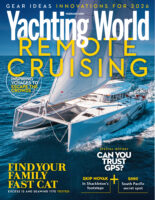Matthew Sheahan talks to the sailor turned round the world race organiser about the highs and lows of his VOR tenure and his decision to leave
Knut Frostad, CEO of the Volvo Ocean Race, is stepping down at the end of 2015 after eight years at the helm.
The 48-year-old Norwegian, who competed in three events as crew aboard Intrum Justitia (1993-94) and then as skipper aboard both Innovation Kvaerner (1997-98) and then Djuice Dragons (2001-02), has been the CEO for three editions starting with the 2008-09 race.
“With almost half of my life and a lot of passion invested in the race, it has been one of the most difficult decisions I have ever had to make,” he said. “But I am an ‘all-or-nothing’ person and this is an ‘all-or-nothing’ race and I want to dedicate more of my time to my young family.”
In politics such a reason might draw skeptical speculation on the true motive but Frostad is adamant that this was the reason that it was time to stand aside and was clear that the decision had not been easy.
“It was a really difficult call to decide to leave,” he told me. “I started as CEO eight years ago and the project since then has been intense. It has been a fantastic experience, but I have worked pretty solidly for all of that time. I am very proud of where the event is now as we have been through some tough times, not just with the event, but having had to negotiate through other major issues such as the world’s economic situation, the threat to the Euro and Spain’s crisis. During this period sailing has been in a difficult place at times and I would have felt terrible about leaving before now.”
Among the various changes that happened on Frostad’s watch the biggest was the move to a one design boat. But this was also the most difficult.
“I tried to float the idea in 2009 but there wasn’t much of an appetite for it,” he said.
But after the 2011/12 event when the list of damage to boats had at times threatened the whole future of the race, there were more grounds to support the idea.
“One of the reasons that the one design project succeeded was that we were able to announce the plans in Lorient before the end of the race. This kept the momentum going.”
Aside from the success of the VO65s, Frostad sees the commercial side of the event as being equally challenging yet rewarding. From signing sponsorship deals for teams and stopovers, to negotiating a contract with the Spanish government to move the entire race operation to Alicante, the work behind the scenes has been relentless.
Another of the changes that he is proud of is the acknowledgement of where the event had come from.
“When I started with Volvo it was almost as if they had agreed that the event had only started in 2001 when they took over the sponsorship, even though they had been attracted to the event’s strong heritage,” he said. “We did a great deal of work with the Boston Consulting Group from which it became clear that this aspect was a very strong one. So we created a new trophy, set up the Legends event and built a museum along with other incentives to bring the history back. I’m very proud of that.”
But there have been dark days too.
“The 2011/12 event wasn’t just a low point but a long nightmare and the toughest race for me. We landed on our feet in the end and all the boats sailed into the finish, but it was tough.
“When boats were breaking down on the first leg to Cape Town and only half of the fleet arrived under sail it was really hard to understand why things were going so wrong as these were not issues that we had any control over.”
He also cites conflicts with teams, especially early on and legal disputes over rules issues as among the less enjoyable days at the helm. But he believes the race has now turned full circle and represents far more of the spirit he remembers from his days as a Whitbread/Volvo sailor.
“I’m not one of those who will say ‘it was never as good as in my day’, but the last race reminded me of the races I competed in. Teams working with each other, parties on the dock and a good atmosphere, it’s good for the people involved, but its also good for the sport and the guests that we bring to it.”
So would he have any advice for his successor?
“You need to be emotionally connected with the event and passionate about the sport,” he said. “Not just for yourself, but because of the relationships that you have to have with so many different groups of people.”
Career highlights
1988 and 1992 – Olympic Games
1993-94 – Whitbread race – Intrum Justicia (SWE) VO60 crew
1997-98 – Whitbread race – Innovation Kværner (NOR) – VO60 skipper
2001-02 – Volvo Ocean Race – Djuice Dragons (NOR) – VO60 skipper
2005-06 – Volvo Ocean Race – Brasil 1 (BRA) – VO70 watch captain on Southern Ocean legs
2008 – Appointed CEO Volvo Ocean Race




